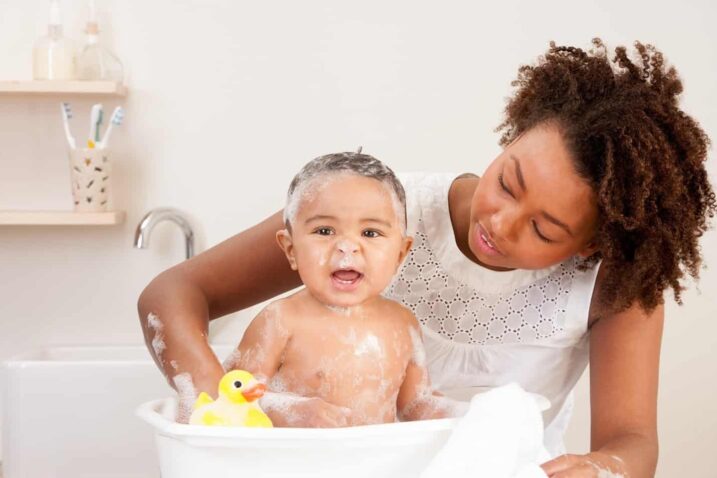Your baby’s skin is the largest organ it has. Proper hygiene, a good diet, and the use of barrier creams are all ways you can help keep your baby’s skin healthy.
Practice Proper Hygiene
Make sure your baby gets into the habit of getting their hands washed regularly and other areas prone to bacteria and dirt build-up. While dirt and grime may seem like minor irritants, they can clog pores and lead to breakouts or rashes. If you have a baby with sensitive skin, try using tepid water instead of hot water when washing their face as it will help soothe the skin and reduce any irritation that may have been caused by a hot bath.
You should also make sure your baby’s clothes are clean and free of any irritants. Avoid exposing them to harsh chemicals or excessive heat, that can damage the skin. And finally, make sure they drink plenty of water to stay hydrated.
If your baby has dry skin, try using a mild shampoo or body wash with moisturizing ingredients like glycerin, vitamin E, or olive oil. Avoid using products that contain alcohol, as this ingredient will strip the skin of its natural protective oils. Products containing aloe vera are also great for helping to cleanse you baby’s skin without drying it out. When buying soap, look for those made with oatmeal as these gently exfoliate skin as they’re washed away.
Ensure Healthy Diet
Diet plays an important role in the health of every organ in your child’s body. Babies that eat healthy diets are less likely to develop allergies or skin conditions like atopic dermatitis. This is because their immune system gets more robust when they eat foods high in antioxidants and vitamins A, C, and E . These nutrients help promote the function of cells throughout their body, including those found in the skin.
Foods high in antioxidants, vitamins, and minerals are great for keeping the skin healthy. Good examples include fruits and vegetables, lean protein, whole grains, and dairy products. Making homemade food for them is a great way to ensure you know exactly what nutrients they’re getting, or going with a trusted baby food brand.
In addition to a healthy diet, it’s essential to give your baby plenty of fluids. This will help keep their skin hydrated and prevent dehydration. Babies need about 6-8 ounces of fluids per day. You can give them water, breast milk, or formula.
Finally, you can promote healthy skin by giving your baby a vitamin supplement. This will help supply any nutrients they may be missing from their diet.
Protection From Diseases
When your baby gets sick, their skin is more prone to damage and irritation. This includes chapped lips, rashes, dryness, eczema outbreaks, cradle cap, intense scratching, and more. The best way to avoid this type of damage is by using barrier cream or ointment on particularly vulnerable areas. Commonly affected areas include the face, hands, elbows, ankles, knees, feet, and around the mouth.

Use Barrier Creams
Barrier creams are ointment or cream that helps protect the skin from bacteria, dirt, and other irritants. They can be used to prevent infection during illness and help keep the skin healthy when exposed to harsh chemicals or excessive heat.
There are several different barrier creams available on the market. It’s essential to choose a barrier cream compatible with your child’s skin type. If they have sensitive skin, pick a cream that is free of harsh chemicals and fragrances.
Barrier creams should be applied liberally to any areas prone to infection. This could include around the diaper area, underarms, between fingers and toes, on the face, or around the mouth.
When applying barrier cream to affected areas of your baby’s skin, it’s important to rub it gently so that pores are not forced open. Make sure you don’t use too much, either. You only need to apply enough cream for a thin coat. Your baby should then be allowed to air-dry without wiping or rinsing off any excess cream.
Practice Using Sunscreen
Another valuable product for promoting healthy skin in babies is sunscreen. While many people associate this with protecting their child’s delicate from harmful UV rays during summer, it can be used year-round. In particular, sunscreen is beneficial if your baby has eczema, as this skin condition tends to worsen when they spend time outside in the heat or sun.
Sunscreen should only be applied to areas that haven’t been affected by atopic dermatitis. This includes around the eyes, nose, and lips. It can also be applied over any barrier cream of the baby. If you’re using a cream or ointment with aloe vera or calendula, make sure to wait until it’s fully absorbed before applying sunscreen. On the contrary, if your child is being treated for atopic dermatitis, layering sunscreen on top of their prescribed treatment plan will help reduce irritation and inflammation.
Maintain Their Water Intake
Their body needs plenty of water to produce sebum – an oily substance that coats the hair and keeps the skin moist and flexible. Ensure your child stays hydrated by offering lots of fluids throughout the day – especially if they’re teething. It’s best not to offer tap water as this often contains high amounts of sodium. Make sure to use clean, filtered water instead.
Don’t forget to keep your baby safe from infections! Babies’ skin loses moisture faster than adults, so make sure you get your hands on a quality humidifier, as it adds moisture to the air to prevent dryness that can result in irritation in many parts of your child’s body. Humidifiers can be considered effective for treating dryness of your child’s skin, lips, throat, and nose.
